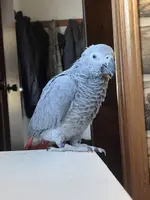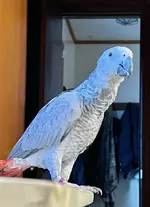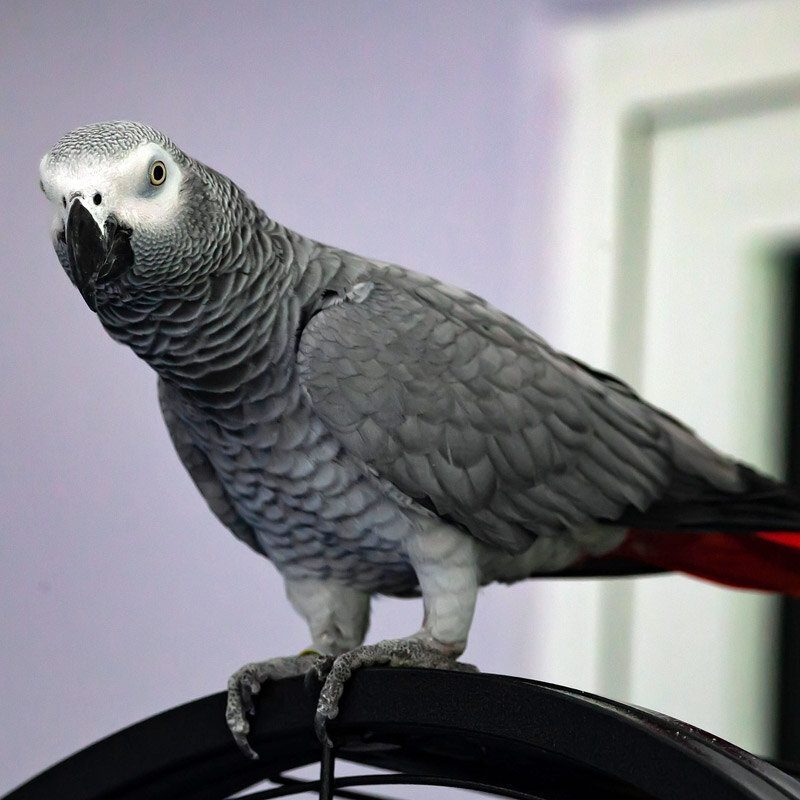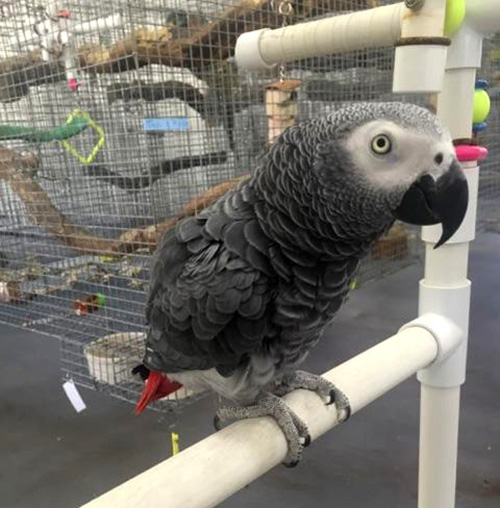Katiepinks
New member
- Mar 4, 2022
- 2
- 5
- Parrots
- African grey
So I got my first bird, a cute African Grey about 6 months old when I got her from a breeder. She’s 9 months old now. When I got her, the breeder informed me that she had a completely different personality than the rest of the hatchlings. That she was very quiet and shy in comparison. She was the only one who he couldn‘t get to ‘step up’ yet and also the only parrot not to start talking. She came to me with very ruffled feathers and she can’t seem to grow feathers in her neck area, and he also said that these babies all seemed to abnormally long necks.
She makes a lot of funny noises sometimes during the day but still has not spoken a word. I think she is trying to find her voice but is struggling.
She was priced relatively cheap, well, in my opinion, at $2000. I think he had this group of birds discounted. I’m trying to figure out why, lol.
Anyways, to the point. She is so shy and scared of everything. I cant introduce any new objects, people, food or anything without it taking days for her to adjust. And certain things she never accepts, just tolerates. She’s sensitive and loves head scratches but still very weird about touch, and she will only step up for me about 1/4 of the time. I don’t want to force her to step up but it makes it difficult to interact with her and socialize her if she doesn’t let me. She never wants to leave her cage. I have left it open every day (I know people will say thats bad but I work from home), and she has only left her cage once. Anyway, I am wondering what I can do to get her to help build her confidence. She won’t take any treats, and whenever I try to give her anything she just throws it across the room. The only thing she will eat are seeds and pellets, and she won’t eat them if she takes it from my hand. Only from her bowl.
So this is my first bird, I own a dog business and train horses. With dogs, when it comes to behaviour modification, it’s actually a lot easier for a trained dog to train another dog. Dogs can communicate to each other in a way that a human will never be able to, through body language. A more nervous dog will follow the lead of a more confident and calm dog naturally. I am wondering if it the same thing with parrots? If I was to get another parrot that is trained/social/tamed/loves people, could that possibly help her? My friend has a conure that is just completely different, such a little clown, so much confidence. I know that not all birds get along, and I would have to find the right match. Maybe a trial run first. Just wondering what peoples thoughts are on that, or if its just a horrible idea. Part of me I think is sort of upset and having a hard time accepting the reality that my bird might never be the social butterfly I was hoping for.
Also, does anyone have any idea why she can’t seem to grow feathers on her neck? I haven’t seen her pluck them or anything.
She makes a lot of funny noises sometimes during the day but still has not spoken a word. I think she is trying to find her voice but is struggling.
She was priced relatively cheap, well, in my opinion, at $2000. I think he had this group of birds discounted. I’m trying to figure out why, lol.
Anyways, to the point. She is so shy and scared of everything. I cant introduce any new objects, people, food or anything without it taking days for her to adjust. And certain things she never accepts, just tolerates. She’s sensitive and loves head scratches but still very weird about touch, and she will only step up for me about 1/4 of the time. I don’t want to force her to step up but it makes it difficult to interact with her and socialize her if she doesn’t let me. She never wants to leave her cage. I have left it open every day (I know people will say thats bad but I work from home), and she has only left her cage once. Anyway, I am wondering what I can do to get her to help build her confidence. She won’t take any treats, and whenever I try to give her anything she just throws it across the room. The only thing she will eat are seeds and pellets, and she won’t eat them if she takes it from my hand. Only from her bowl.
So this is my first bird, I own a dog business and train horses. With dogs, when it comes to behaviour modification, it’s actually a lot easier for a trained dog to train another dog. Dogs can communicate to each other in a way that a human will never be able to, through body language. A more nervous dog will follow the lead of a more confident and calm dog naturally. I am wondering if it the same thing with parrots? If I was to get another parrot that is trained/social/tamed/loves people, could that possibly help her? My friend has a conure that is just completely different, such a little clown, so much confidence. I know that not all birds get along, and I would have to find the right match. Maybe a trial run first. Just wondering what peoples thoughts are on that, or if its just a horrible idea. Part of me I think is sort of upset and having a hard time accepting the reality that my bird might never be the social butterfly I was hoping for.
Also, does anyone have any idea why she can’t seem to grow feathers on her neck? I haven’t seen her pluck them or anything.






